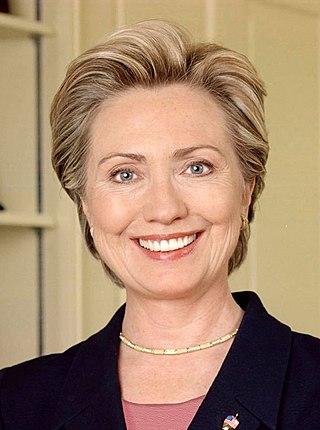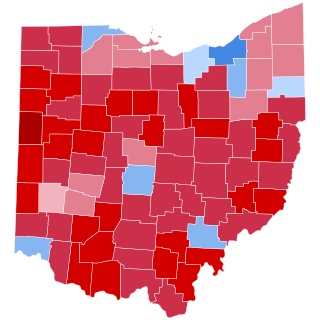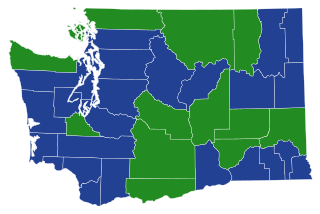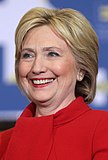
The 2008 Iowa Democratic presidential caucus occurred on January 3, and was the state caucuses of the Iowa Democratic Party. It was the first election for the Democrats of the 2008 presidential election. Also referred to as "the First in the Nation Caucus," it was the first election of the primary season on both the Democratic and Republican sides. Of the eight major Democratic presidential candidates, then-U.S. Senator Barack Obama of Illinois received the most votes and was ultimately declared the winner of the Iowa Democratic Caucus of 2008, making him the first African American to win the caucus and the first African American to win a primary state since Jesse Jackson in 1988. Former U.S. Senator John Edwards of North Carolina came in second place and then-U.S. Senator Hillary Clinton of New York finished third, though Clinton received more delegates than Edwards. Campaigning had begun as early as two years before the event.

The 2008 Nevada Democratic presidential caucuses took place on January 19, 2008 after having been moved from a later date by the Nevada Democratic Party. The Nevada Democratic Caucus was considered important in determining the eventual party nominee, as many described it as the "Bellwether of the West" seeing as how it is the first Western state to vote in the Democratic Presidential Primary season.

The Nevada presidential caucuses are an electoral event in which citizens met in precinct caucuses to elect delegates to the corresponding county conventions. In 2021, Harry Reid passed legislation (AB321) to include primaries in hopes of increasing voter turn-out. Nevada has for decades and still does have a caucus. The caucus is where the delegates receive the votes that will be carried to the National Convention and not the primaries. There are 17 counties in Nevada and the state has 26 delegates. The Nevada caucuses began in 1981. The Kerry/Dean caucus was held on February 14, 2004. In 2008 the DNC gave Nevada the official first in the west status reflecting the growing importance of the West as well as Nevada's electoral bellwether status. The 2008 Nevada caucuses were the third major electoral event in the nominating process for President of the United States. In 2016, the Democratic caucus was held on February 20 and the Republican caucus was held on February 23.

The 2008 Vermont Democratic presidential primary was an open primary that took place on March 4, 2008. Barack Obama won the primary, his only decisive win among the four March 4 contests. The primary determined the 15 pledged delegates that represented Vermont at the 2008 Democratic National Convention. The delegates were awarded to the candidates, Obama and Hillary Clinton, on a proportional basis. Vermont also sent 8 unpledged "superdelegates", to the convention not bound by the results of the primary.

This article contains opinion polling by U.S. state for the 2016 Democratic Party presidential primaries. For currency and accuracy, please note the specific dates for each polling as listed below. For the significance of the earliest state votes, the Iowa caucuses and the New Hampshire primary, see United States presidential primary – Iowa and New Hampshire. To know when any given state votes, see the timeline of primaries and caucuses.

Presidential primaries and caucuses were organized by the Democratic Party to select the 4,051 delegates to the 2016 Democratic National Convention held July 25–28 and determine the nominee for President in the 2016 United States presidential election. The elections took place within all fifty U.S. states, the District of Columbia, five U.S. territories, and Democrats Abroad and occurred between February 1 and June 14, 2016. Between 2008 and 2020, this was the only Democratic Party primary in which the nominee had never been nor had ever become President of the United States. This was the first time the Democratic primary had nominated a woman for president.
The following is a timeline of major events leading up to, during, and after the 2016 United States presidential election. The election was the 58th quadrennial United States presidential election, held on November 8, 2016. The presidential primaries and caucuses were held between February 1 and June 14, 2016, staggered among the 50 states, Washington, D.C., and U.S. territories. The U.S. Congress certified the electoral result on January 6, 2017, and the new president and vice president were inaugurated on January 20, 2017.
In the 2016 presidential campaign, Vermont Senator Bernie Sanders sought the Democratic Party's nomination in a field of six major candidates and was the runner up with 46% of the pledged delegates behind former Secretary of State Hillary Clinton, who won the contest with 54%. Sanders, the junior United States senator and former Representative from Vermont, began with an informal announcement on April 30, 2015, and a formal announcement that he planned to seek the Democratic Party's nomination for President of the United States on May 26, 2015, in Burlington, Vermont. Sanders had been considered a potential candidate for president since at least September 2014. Though he had previously run as an independent, he routinely caucused with the Democratic Party, as many of his views align with Democrats. Running as a Democrat made it easier to participate in debates and get his name on state ballots.

The 2016 United States presidential election in Nevada was held on Tuesday, November 8, 2016, as part of the 2016 United States presidential election in which all 50 states plus the District of Columbia participated. Nevada voters chose electors to represent them in the Electoral College via a popular vote, pitting the Republican Party's nominee, businessman Donald Trump, against the Democratic Party's nominee, former U.S. Secretary of State Hillary Clinton. Nevada has six votes in the Electoral College.

The 2016 Iowa Democratic presidential caucuses were held on Monday February 1 in Iowa, as usual marking the Democratic Party's first nominating contest in their series of presidential primaries ahead of the 2016 presidential election.

The 2016 Idaho Democratic presidential caucuses took place on March 22 in the U.S. state of Idaho as one of the Democratic Party's primaries ahead of the 2016 presidential election.

The 2016 United States presidential election in Ohio was held on Tuesday, November 8, 2016, as part of the 2016 United States presidential election in which all 50 states plus the District of Columbia participated. Ohio voters chose electors to represent them in the Electoral College via a popular vote, pitting the Republican Party's nominee, businessman Donald Trump, and running mate Indiana Governor Mike Pence against Democratic Party nominee, former Secretary of State Hillary Clinton, and her running mate Virginia Senator Tim Kaine. Ohio had 18 electoral votes in the Electoral College.

The 2016 South Carolina Democratic presidential primary took place on February 27 in the U.S. state of South Carolina, marking the Democratic Party's fourth nominating contest in their series of presidential primaries ahead of the 2016 presidential election.

The 2016 Wisconsin Democratic presidential primary was held on April 5 in the U.S. state of Wisconsin as one of the Democratic Party's primaries ahead of the 2016 presidential election. Vermont senator Bernie Sanders won the contest with 56.5%, distancing nationwide frontrunner Hillary Clinton by 13 percentage points.

The 2016 Wyoming Democratic presidential caucuses were held on April 9 in the U.S. state of Wyoming, representing the first tier of the Wyoming Democratic Party's nomination contest for the 2016 presidential election. Only registered Democrats were allowed to participate in the closed precinct caucuses.

The 2020 United States presidential election in Nevada was held on Tuesday, November 3, 2020, as part of the 2020 United States presidential election in which all 50 states plus the District of Columbia participated. Nevada voters chose electors to represent them in the Electoral College via a popular vote, pitting the Republican Party's nominee, incumbent President Donald Trump, and running mate Vice President Mike Pence against Democratic Party nominee, former Vice President Joe Biden, and his running mate California Senator Kamala Harris. Nevada has six votes in the Electoral College.

The 2020 Nevada Democratic presidential caucuses took place on February 22, 2020, with early voting on February 14–18, and was the third nominating contest in the Democratic Party primaries for the 2020 presidential election, following the New Hampshire primary the week before. The Nevada caucuses were a closed caucus, meaning that only registered Democrats could vote in this caucus. The state awarded 49 delegates towards the national convention, of which 36 were pledged delegates allocated on the basis of the results of the caucuses.

The 2020 Washington Democratic presidential primary took place on March 10, 2020, as one of several states voting the week after Super Tuesday in the Democratic Party primaries for the 2020 presidential election. The state-run semi-open primary, which was used instead of party-run caucuses for the first time by Washington's Democrats, awarded 109 delegates to the 2020 Democratic National Convention, of which 89 were pledged delegates allocated according to the results of the primary.

The 2020 Maine Democratic presidential primary took place on March 3, 2020, as one of 15 contests scheduled on Super Tuesday in the Democratic Party primaries for the 2020 presidential election, following the South Carolina primary the weekend before. The Maine primary, the first in the state since 2000, was a closed primary, meaning that only registered Democrats could vote in this primary, but unenrolled voters were permitted to enroll in a party at the polls with same day registration. The state awarded 32 delegates towards the 2020 Democratic National Convention, 24 of which were pledged delegates allocated based on the results of the primary. The primary election coincided with a people's veto referendum to reject changes to Maine's vaccination laws.





















